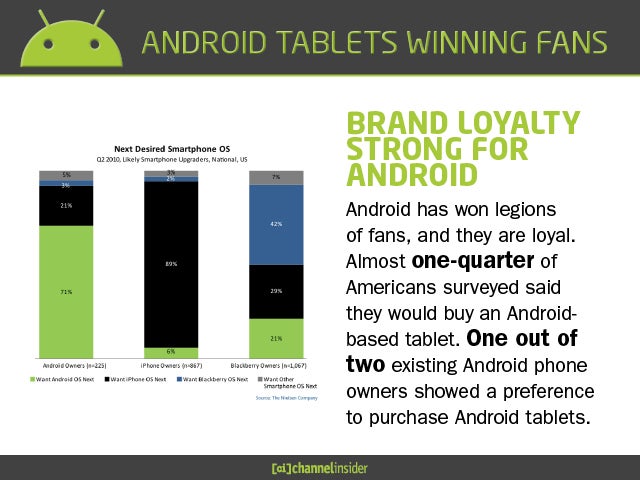 Brand Loyalty Strong for Android
Brand Loyalty Strong for Android
Android has won legions of fans, and they are loyal. Almost one-quarter of Americans surveyed said they would buy an Android-based tablet. One out of two existing Android phone owners showed a preference to purchase Android tablets.
 Bye-Bye Laptop?
Bye-Bye Laptop?
Twenty-five percent said they are likely to replace their laptop with a tablet for both work and personal use. Fifty-six percent said they’d prefer a tablet with embedded WAN and an attached data package instead of paying more for a carrier-agnostic tablet. That could spell trouble for the “BlackPad”, which requires tethering a RIM device for WAN connectivity.
 Enterprises Expected to Support Tablets
Enterprises Expected to Support Tablets
The consumerization of IT is driving all sorts of devices into business use, and employees expect support for them more and more. It’s no different with tablets – 25 percent of Americans expect their employers to provide access to tablets in the enterprise.
 What’s the Benefit?
What’s the Benefit?
Can tablets really impact enterprise efficiency and productivity? Americans think so. Among the benefits cited are innovation (18 percent), efficiency, time savings and problem solving (16 percent), and communication, collaboration and productivity (14 percent).
 Touch is Nice, but a Keyboard is Better
Touch is Nice, but a Keyboard is Better
Touch screens are sexy, but when you’re writing a proposal or coding an application, touch screens can be a headache. Americans agree. Almost 33 percent said a physical keyboard is a crucial tablet component.
 Video Conferencing not Mainstream
Video Conferencing not Mainstream
Video conferencing may seem sleek and high-tech, but people in the market for a tablet don’t care. Only 7 percent were interested in video conferencing features, and, surprisingly, only 4 percent cared about a camera. That’s bad news for Avaya which just released its “Flare” tablet focused on video conferencing. Cisco’s video conferencing tablet release is just around the corner.
 The Cheaper the Better
The Cheaper the Better
As tablets become more mainstream and more emerge, prices are bound to go down. But, Americans are expecting to shell out a little less than they would for the average selling price of a laptop, with expectations of paying about $300 or less for a tablet.
 The Business Case
The Business Case
"As users clamor to bring the latest devices into the workplace, enterprises cannot avoid evaluating the business case for tablet and other new device support," said Willie Jow, vice president mobility, Sybase.

